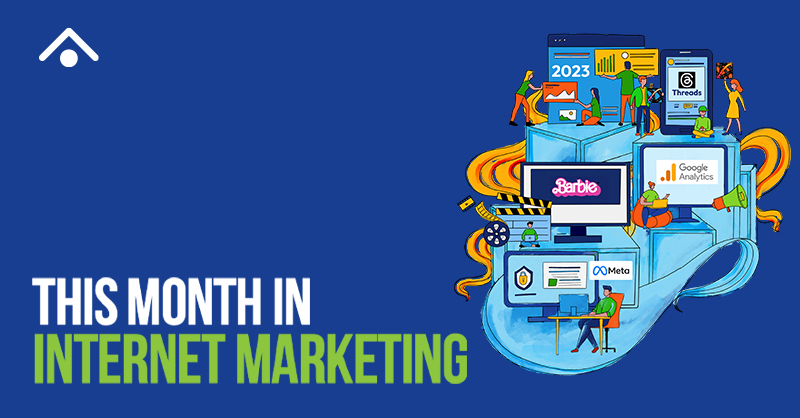It was nice knowing you, July!
If this month passed by you in a complete blur and you have trouble recalling what happened, let’s take a quick trip down memory lane. As always, the Toronto weather was inconsistent as ever. One moment there would be bright sunshine and calming winds, and the next, there were dark skies and heavy downpour. But we didn’t let that keep us from enjoying the summer!
When it comes to summer activities, a number of interesting events and celebrations took place. From vibrant fireworks displays on Canada Day and outdoor movies under the starry night sky to much-anticipated film festivals and lively art fairs. But with so much going on in the city, what has been happening in the marketing world?
Regardless of the time of year, there’s always something cooking in the digital marketing space. New social media network releases, big-name brand campaigns, marketing guides–and the list goes on. However, we know that having so much news thrown your way can be overwhelming. That’s why we have gathered some of the most topical articles we think you should digest.
Without further ado, we have put together five highlights we think you should know about. From Threads to Barbie marketing campaigns, here’s what happened this month in marketing.
Meta Threads’ Rapid Rise Proves the Power of an Owned Audience

This month, we were introduced to Meta’s newest baby–Threads.
This app rivals Twitter, as it was designed to provide a safer space to share thoughts and conversations through text. You might be wondering how it can have any appeal when it feels like a direct copycat of Twitter. Well, even though the social media network hasn’t been available to the public for very long, it has quickly amassed over 100 million followers in less than a week.
Given that Instagram already has over 2 million users that had to agree to sign up to make an account on Threads, it only makes sense how the platform gained so many followers quickly. Another key takeaway from this is that it also demonstrates the power of having an engaged, owned audience. But how does this newbie app come into play with marketing?
According to the Content Marketing Institute’s latest article, Meta doesn’t plan to sell advertising on Threads, at least not until early next year. However, several reports have revealed that Meta is already pitching to potential advertisers. Moreover, Meta intends to establish brand safety and community standards for Threads, as it does with Instagram guidelines.
If you’re wondering whether Meta will create different contextual ad placements, you should know that Threads operates similarly to TikTok. Simply put, the algorithm enables users to see content that isn’t solely from their following or followers list. As of right now, people have already started using Threads for organic ads and sponsored content placement.
To learn the full details about Meta’s latest social media network, read the blog here.
This Barbie is a Marketing Genius: Unveiling the New Movie’s Phenomenon

Source: Barbie-themovie
If you have always aspired to be a Barbie girl living in a Barbie world, Greta Gerwig’s latest movie will feel like a dream come true. Not only does the movie portray a fantastic explosion of all things pink and feminine while evoking childhood nostalgia, but its marketing is truly phenomenal.
In their latest blog, Rock Content dives deep into all the marketing efforts that the Barbie movie invested in, and they are worth learning a thing or two from.
Back in April, social media was flooded with people sharing photos of themselves with the Barbie movie poster. The marketing team created an AI filter that allowed people to upload their photos and create a movie poster with the tagline, “Barbie is a _____”. This led to an endless wave of memes that ended up working out in the film’s favour. Not only did it showcase the power of AI, but it also helped boost interactivity and widespread sharing through the creation of user-generated content.
But it doesn’t stop there. In case you haven’t heard, the brand collaborated with the Metaverse and game world. Through its collaboration with Forever21, there was a new release of clothing in physical stores as well as the virtual realm of Roblox. Xbox even hosted a contest where one lucky winner could receive a pink console housed in a mini replica of Barbie’s Dreamhouse, and players of Forza Horizon 5 could win an in-game replica of Barbie and Ken’s cars from the movie.
If you're often scrolling through your phone, chances are that the latest Barbie products have caught your eye too. There were countless brand collaborations with big-name brands, including ALDO , NYX, AirBnb and Moon Oral Beauty, among others. You might have noticed that, unlike the traditional focus on children, these products were marketed toward adults. This is another clever marketing tactic because the film’s intended audience is adults, and they have grown up with Barbie.
Interested in learning more about how Barbie’s marketing has been a complete work of genius? Visit the blog here.
20 Great Landing Page Examples You'll Want to Copy in 2023

Source: Shutterstock
If you want more online visitors to stay on your site and bring in conversions, you need to create quality landing pages that stick.
The primary purpose of a landing page is to provide a prospective customer with a resource. This can be in the form of an ebook or webinar signup, for example, and is given in exchange for their contact information. The main objective of landing pages is to gain more leads and get more prospects into the customer funnel.
But why not use any kind of regular ad instead? Contrary to basic advertisements, landing pages help engage and delight customers by offering them something related to a specific product or industry. After completing the form and being rewarded with unique content, they are more likely to feel trust towards your brand and become loyal customers.
Even though the concept of landing pages may seem simple, the real challenge is designing a successful one, as it requires detailed planning and creative testing. Once you've created an eye-pleasing, functional landing page, the work doesn't end there. Additionally, you need to keep an eye on conversion rates to see how well your landing page is performing.
In their blog, HubSpot thoroughly explains how businesses can optimize their landing pages and shares helpful examples from huge companies to draw inspiration. Some notable ones are AirBnb, WiX, Express VPN and Row House. On top of that, the blog includes what lessons can be taken away from each brand and how they can be applied to your own landing page.
Are you ready to optimize your landing page and acquire more conversions? Don’t wait and read the blog here today!
Canada’s government to stop advertising on Facebook and Instagram after Meta says it will block news

Source: Shutterstock
Unless you’re living under a rock, you have most likely heard about Meta's decision to block news content across social media platforms. Unfortunately, this will cause consumers to lose access to important information, leading news outlets to also lose viewers, advertisers, and profit. In response, the Canadian government aims to cease advertisements on Facebook and Instagram.
But first, let's backtrack a bit to get everyone up to speed on the latest updates.
Last month, Meta released a statement claiming to temporarily block Canadian news content on its Facebook and Instagram platforms to address Canada’s recently passed Bill C-18, the Online News Act. This bill proposed that tech giants, such as Meta and Google, are expected to pay publishers for linking to or otherwise repurposing their content online. Meta also said it's prepared to permanently block news content on Facebook and Instagram for Canadians if the bill passes.
Fast forward to the present, and the bill has officially been passed and will be in effect in less than six months. In their recent article, AP News explains that as a result of this, Meta has commenced blocking news content from Instagram and Facebook. Canadian Heritage Minister, Paul Rodriguez, said Meta's actions are “unreasonable” and “irresponsible,” and that Canada would stop advertising on their platforms.
On the contrary, a Meta spokesperson argued that the Online News Act is “flawed legislation that ignores the realities of how our platforms work.” He further expresses that the company doesn't collect links to news content for their social platforms and that publishers are the ones deciding whether to post them on Facebook or Instagram.
To check out the full article, click the link here. If you would like to learn more about how we can help you take advantage of the news ban, check out our blog.
10 Great Google Analytics Alternatives

Source: Shutterstock
For several years, Google Analytics has been a great source that provides statistics and basic analytical tools for search engine optimization (SEO) and marketing purposes. With its constant breaches of privacy, however, many marketers are doubting their loyalties toward it and looking elsewhere.
If you find yourself in that same boat but have no idea where to go, fear not! There are several alternatives that can perform as well–or even better–than Google Analytics itself. You just have to do some digging to find one that unearths the necessary data and helps streamline your daily operations. That's where we come in.
Whether you have privacy concerns, are on the hunt for an easier tool, or simply want to have fun trying a new one, we have the perfect lineup prepared for you.
In their blog, the Search Engine Journal goes over some great alternatives to Google Analytics. With meticulous detail, they explain the different features and privacy levels each tool offers, along with their trial periods, pricing and packages. Check out a few of them below:
- Matomo
- Woopra
- GoSquared
- Wideangle
- Mixpanel
For more information about all the other great Google Analytics alternatives and how you can benefit from them, read the blog here.
Wrap Up
This blog went over the release of Threads and its potential for advertising in the marketing realm.
Then we went over the Barbie movie’s outstanding marketing campaigns and brand collaborations and all the great lessons that can be learned from them.
Next, we learned how to optimize landing pages to attract more online visitors and drive conversions.
After that, we discussed Meta’s news ban on Facebook and Instagram and how it will affect marketers.
Finally, we went over the best alternatives to Google Analytics that everyone should consider looking into.
Any questions, comments, or concerns? We’d love to hear your feedback!
We’ll be back next month with five new articles for you. In the meantime, if you’re looking to learn more, please check out our existing blogs that cover various digital marketing topics!






